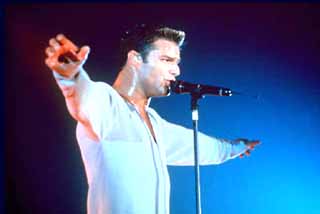To Be Seen and Heard
By Belinda Acosta, Fri., June 11, 1999
|
|
I have a convoluted view of the entertainment industry. I'm reminded of this after conversations with like-minded friends and particularly un-like-minded folks. I'm reminded of it when observing the machinations of the entertainment industry in general and the television industry in particular. Actually, that's not completely accurate. Most of the time, I'm consciously oblivious to the multiple lenses with which I am viewing the media, until something hits me like a rock between the eyes, to splay the lenses, and makes me refocus my vision.
Confused? Sometimes I am, too.
The first time I was hit between the eyes was in 1978. I was sitting at home in Lincoln, Nebraska, watching (what else?) TV. It was a Friday afternoon, when a self-directed, conscientious university sophomore should have been studying for a biology test. Being neither self-directed nor conscientious, I was checking out the cable my brother and I had miraculously convinced my mother was a necessity (we had it for a month). I scanned and landed on one of the movie channels just as the opening scenes of Luis Valdez's Zoot Suit appeared on the screen. When that younger, agile, and very cool Edward James Olmos glided onto the screen, I was mesmerized. And then came that rock -- more like a boulder -- that hit me upside the head to bring into view 19 years of invisibility. A ghost that had been lightly embossed into my consciousness burst through and came at me in 3-D, in living color, breathing, pulsating, sweating. All those people, right there on TV, captivated me. Not the Frito Bandito or Ricky Ricardo, or some generic, sultry señorita named Maria. These people were complicated and interesting; their story was compelling, and they looked like my mom, my uncle, my dad, my gramma, and me.
I didn't have words to describe what that experience was and didn't until years later when I came across some writings by Adrienne Rich, who said that when the world is presented or described and you are not in it, "there is a moment of psychic disequilibrium, as if you looked into a mirror and saw nothing. Yet you know you exist and others like you ... It takes some strength of soul ... to resist this void, this nonbeing ... and to stand up, demanding to be seen and heard."
There were two events last week that made me think about all this: the 1999 American Latino Media Arts (ALMA) Awards telecast on ABC, and the continuing emergence of the current flavor (or should I say, sabor) of the moment, Ricky Martin. The ALMAs are sponsored by the National Council of La Raza (NCLR) to recognize positive performances and contributions by Latinos in television, film, and music. (The Essence Awards were telecast on Fox the night before, recognizing African-Americans in the entertainment industry.) It's always a charge to see all these Latino performers gathered in one place to celebrate. Whether non-Latinos watch and appreciate the program as much as I (and presumably other Latinos) do is a moot question. Someone is tuning in -- Latino or otherwise -- making it worthwhile to commercial sponsors, of which there were plenty. The big disappointment of the evening was the number and frequency of commercials, but strangely, even they were encouraging. Many were in Spanish, with English subtitles, or bilingual, which definitely made a pocha like me feel as though I'd been paid attention to. Not that I'm eager for insurance, fast food, or long distance phone service pitches every two minutes, but I do notice when a message is directed to me. The novelty of it alone is enough to keep me from scanning channels during commercial breaks.
Watching the ALMAs let me imagine that the networks might take a hint from Telemundo. The Spanish-language network is planning more programming to appeal to a bilingual, or partially Spanish-speaking, audience. In the 1999-2000 season, Telemundo will premiere the first U.S.-themed telenovela, appealing to U.S. Latinos in this country. For the uninitiated, telenovelas are part soap opera, part miniseries. For those familiar with the form, it will be the opportunity to see programming spoken in the bicultural vocabulary that has long been second nature and a source of survival. I can see it now: local viewers sending video copies of these telenovela hybrids to Telemundo-deprived friends and relatives up North, with as much loving care as homemade tamales. Laugh now, but remember my words.
All of this is to say that while U.S. television is slow to develop programming for Latino viewers, ironically, it is the very medium that launched the current pop phenom, Ricky Martin. Words like "sensation," "hot," "crossover," and "the Puerto Rican Elvis" (that one is from Rosie O'Donnell) are now attached to his name.
The comparison between Martin and Presley is inevitable given the charisma and sex appeal of both. As with Presley, a key television appearance blasted Martin into the limelight. His now-legendary appearance on the Grammys will long be cited as the springboard for his leap to "sensation" status. But unlike Presley, Martin already had a global following and, to be sure, a following among U.S. Latinos. That mainstream U.S. audiences are just now "discovering" him is, well, interesting.
What would have happened had Martin not appeared on the Grammys, an appearance which made MTV clamor for his video, "Livin' la Vida Loca"? What if he hadn't appeared on Saturday Night Live (the same night Monica Lewinsky was a guest)? The Latino fans who already knew him would find themselves focusing and refocusing their lenses back and forth from the world that largely ignores them to the world of Ricky, and back again, just like always. And Ricky? I imagine he'd still be living his life, maybe just a little less crazy than it is now.
!Llamame!
Are you wild about telenovelas? Are you hooked on Camila? Do you tape Una Luz en el Camino or El Pais de las Mujeres? Do you know the storylines of Mundo de Juegetes, Los Ricos Tambien Lloran, or Dos Mujeres, Un Camino? If so, I want to hear from you. What do telenovelas offer that English-speaking television doesn't? What are your favorites from the past, and what are you watching now? E-mail responses to the address below.
Take a station break at TVEye@auschron.com









